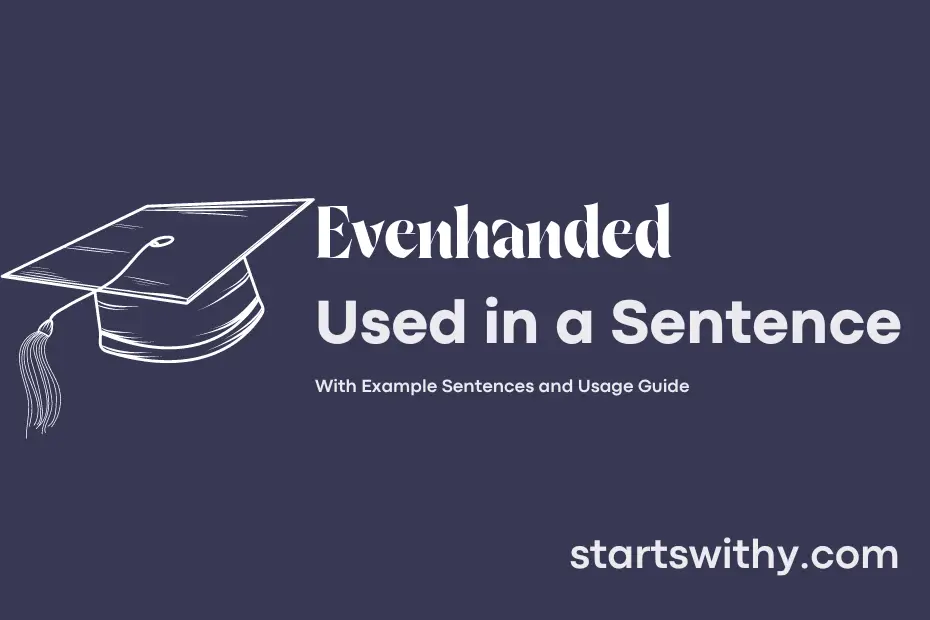An evenhanded approach is characterized by fairness, neutrality, and objectivity in making decisions or judgments. It involves treating all parties or viewpoints equitably and without bias.
Being evenhanded means maintaining a balanced perspective, considering all relevant factors without favoring one side over another. Whether in personal relationships, professional settings, or daily dilemmas, practicing evenhandedness fosters trust, equality, and cooperation among individuals and groups.
7 Examples Of Evenhanded Used In a Sentence For Kids
- Everyone should be treated evenhandedly in games.
- The teacher always tries to be evenhanded when giving out stickers.
- It is important to be evenhanded when sharing toys with friends.
- The best leaders are fair and evenhanded with their decisions.
- When playing, it’s good to be evenhanded and take turns.
- We should be evenhanded and fair when helping others.
- It’s nice to be evenhanded and share snacks with classmates.
14 Sentences with Evenhanded Examples
- Evenhanded grades were given out by the professor to ensure fairness among all students.
- The college debate team prided themselves on their evenhanded approach to presenting both sides of an argument.
- It’s important for student council leaders to be evenhanded when making decisions that affect the entire campus community.
- The college counselor was known for her evenhanded advice when helping students choose their majors.
- Evenhanded distribution of resources among student clubs helped promote inclusivity on campus.
- The college disciplinary committee is required to follow an evenhanded process when addressing student misconduct.
- The university’s scholarship committee carefully reviewed each application with an evenhanded approach to ensure fairness.
- The student government elections were praised for their evenhanded treatment of all candidates.
- The professor’s feedback on assignments was always evenhanded and constructive.
- College professors are expected to be evenhanded when grading exams to ensure academic integrity.
- The college sports teams are known for their evenhanded representation of both male and female athletes.
- The student newspaper prided itself on its evenhanded reporting of campus events.
- Student leaders should aim to be evenhanded when representing the interests of their peers.
- The university’s code of conduct emphasizes the importance of evenhanded treatment of all students.
How To Use Evenhanded in Sentences?
Evenhanded
Evenhanded means fair and impartial. When using evenhanded in a sentence, it is important to remember its definition to ensure it is used correctly.
Here are some examples of how to use evenhanded in a sentence:
- “The judge was known for being evenhanded in his decisions, always considering both sides fairly.”
- “It is crucial for the mediator to remain evenhanded throughout the dispute resolution process.”
- “The journalist’s reporting was praised for its evenhanded approach, presenting the facts without bias.”
When incorporating evenhanded in your writing or conversation, consider the context and tone to ensure it fits appropriately.
Here are some tips for using evenhanded effectively:
- Understand the meaning: Before using evenhanded, make sure you understand its definition as fair and impartial.
- Use it in the right context: Ensure that the situation warrants the use of evenhanded to convey fairness.
- Check for relevance: Confirm that using evenhanded adds value to your sentence and accurately reflects the intended message.
By following these guidelines, you can confidently incorporate evenhanded into your vocabulary and communication effectively.
Conclusion
In conclusion, the importance of being evenhanded in various situations cannot be understated. Whether it is in the legal system, politics, or personal relationships, maintaining a fair and unbiased approach is crucial for fostering trust and promoting justice. By making decisions and judgments with an evenhanded perspective, individuals can ensure that all parties are treated equitably and that conflicts are resolved in a just manner.
Being evenhanded requires setting aside personal biases and preconceptions to assess situations objectively. It involves carefully considering all perspectives and evidence before reaching a conclusion. Ultimately, embodying fairness and impartiality in our actions and decisions not only strengthens relationships and communities but also upholds the principles of justice and equality.



